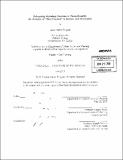Rehousing homeless families in Massachusetts : an analysis of "best practice" in Boston and Worcester
Author(s)
Delgado, Laura Humm
DownloadFull printable version (7.719Mb)
Other Contributors
Massachusetts Institute of Technology. Dept. of Urban Studies and Planning.
Advisor
Langley Keyes.
Terms of use
Metadata
Show full item recordAbstract
In 2009, three significant events related to family homelessness converged on the Massachusetts Department of Housing and Community Development (DHCD). First, the shelters for homeless families in Massachusetts were at capacity, and over 1,000 homeless families had been placed in hotels and motels across the state. Second, Article 87 of the Amendments to the Constitution transferred the Commonwealth's Emergency Assistance (EA) program to the Massachusetts Department of Housing and Community Development (DHCD), thereby designating DHCD to run the emergency shelter system for homeless families and individuals. Third, the United States Department of Housing and Urban Development granted Massachusetts $45 million to implement the Homelessness Prevention and Rapid Re-housing Program (HPRP), a part of the American Recovery and Reinvestment Act of 2009. With the newly acquired responsibility to run the EA program, put HPRP into practice, and rehouse the homeless families, especially those in hotels and motels, in Massachusetts, DHCD developed "the Architecture." The Architecture introduced a new policy model for how to address homelessness in Massachusetts through prevention, diversion, rehousing, and stabilization. It also provided the narrative for the HPRP Request for Responses that DHCD released July 3 1, 2009. This thesis is an analysis of how two "best practice" agencies in Massachusetts put the HPRP policy into practice using the Architecture developed by DHCD. Those two agencies are Metropolitan Boston Housing Partnership (MBHP) in Boston and the Central Massachusetts Housing Alliance (CMHA) in Worcester. The agencies' practices upon which this research focuses are rehousing and stabilization programs for homeless families, including landlord outreach and support. This thesis provides an analysis of how the agencies incorporate this new HPRP policy into existing practice while coping with the challenges and dilemmas they encounter along the way.
Description
Thesis (M.C.P.)--Massachusetts Institute of Technology, Dept. of Urban Studies and Planning, 2010. Cataloged from PDF version of thesis. Includes bibliographical references (p. 94-97).
Date issued
2010Department
Massachusetts Institute of Technology. Department of Urban Studies and PlanningPublisher
Massachusetts Institute of Technology
Keywords
Urban Studies and Planning.